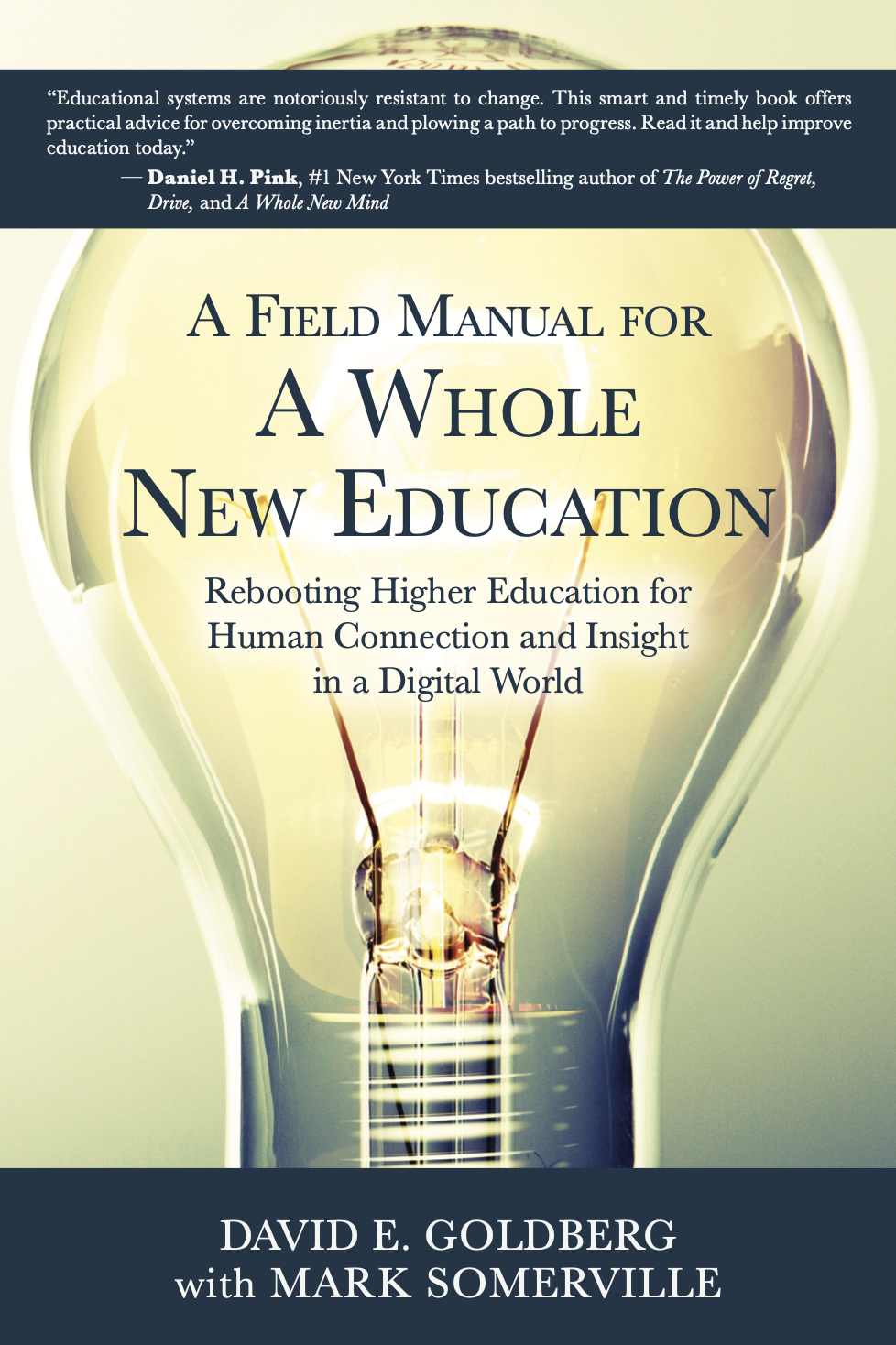
Interested in reviewing the book or interviewing the authors?
A Field Manual for a Whole New Education
Rebooting Higher Education for Human Connection and Insight in a Digital World
“A Field Manual for A Whole New Education” overcomes inertia through:
5 shifts
in skill and mindset to unleash lifelong learners and their educators.
4 sprints and spirits
to overcome faculty ego and design great programs.
3 practices of curious listening
—the keystone habit of great educational cultures.
2 surprising keys
to implementation that take schools on “a journey to a good mood.”
1 essential advantage
humans have over the digital gaggle (AI, apps, and robots) that puts the right educational stuff in sharp focus.
Praise for “A Field Manual for a Whole New Education”
We successfully transformed the College of Technology to the Purdue Polytechnic using proto- types of the methods described in this field manual. Read it, follow it, and hold on for what can be both a rapid and effective approach to deep student (and faculty) engagement and success.
This field manual is chock full of innovative thinking and specific, practical action frameworks. Read it, reflect upon it, and use it to reboot your corner of higher education culture.
I am confident that A Field Manual for a Whole New Education will be my everyday companion as I work to bring needed changes to a Brazilian public university. Said simply and in Portuguese, o livro é muito legal.
Dipping and diving into the methods described in this field manual has helped me to unleash engineering students towards building a sociotechnical leadership mindset. The methods reach beyond course content and provide practical insights that can start us down the path to making the changes that higher education needs today.
How did the MIDAS programme at UTS do it? By adopting the heart and mind approach advocated in A Field Manual for a Whole New Education, our faculty and students embraced a once voluntary studio-based approach with energy. Read and re-read this practical guide and achieve startlingly effective changes today.
I became aware of the possibilities unleashed by this field manual through a pioneering initiative to spread its methods around the globe. As an engineer at a major consulting firm in Latin America, I had the opportunity to join a pilot where I had my practice and my life so deeply changed that it led me to direct a successful initiative to help poor-smart- altruist undergrads learn how to lead. This manual is a must read for everyone who wants to lead the educational change that the world is urging!
A Field Manual for a Whole New Education builds on the groundbreaking work of A Whole New Engineer, Goldberg and Somerville’s previous book. It highlights the importance of what they call ‘shift skills’ including reflection, curiosity, and listening. The “reflexercises” provide a practical method for integrating the learning in this important contribution to the ongoing “reboot” of higher education.
Witty and briskly written, this book is a whirlwind of insights into why conventional academic processes of educational reform often end up just promoting curricular tweaks rather than motivating creative, inspirational change. Building on the success of their A Whole New Engineer, the authors bypass conventional memes to develop an ambitious process involving activities such as curious listening, uplifting emotion and joy, and taking student perspectives seriously. A highlight of the volume is the many opportunities it presents for readers to engage with it at their own pace and level of interest. An ambitious and refreshing must-read not only for engineers but for anyone interested in practical how-to’s for transforming programs in higher education.
Educational systems are notoriously resistant to change. But this smart and timely book offers practical advice for overcoming inertia and plowing a path to progress. Read it and help improve education today.
Critical aspects of A Field Manual for a Whole New Education are proving very supportive for our transformation journey in DCU Futures, where our ambition is to radically reimagine the undergraduate curriculum. It prompts us to reflect, challenges our orthodoxies, and provides structures and frameworks that empower us. In short, it is a go-to text that is never far from my reach, and I unequivocally recommend it.
Chapter 1
To Higher Education With Love
Chapter 2
"A Whole New Engineer" in 4.8 Minutes
Chapter 3
New Lessons From the Frontlines of Change
Chapter 4
5 Shifts for the Cultivation of Connection & Insight
Chapter 5
Curious Listening: Keystone Habit of Educational Change
Chapter 6
Four Sprints & Spirits for Rapid, Embraced Change
Chapter 7
A Process, Place, & People for Affective Implementation
Chapter 8
Taking the Manual to the Field
